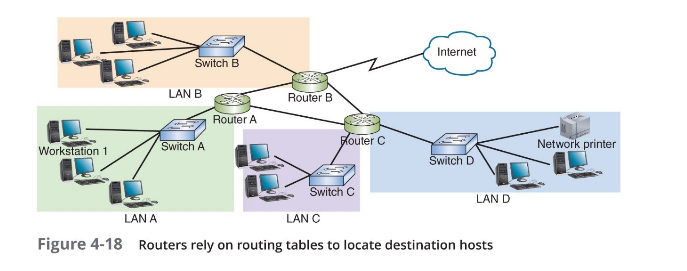Router
- Joins two or more networks
- Passes packets from one network to another
- Can do the following:
- Connect dissimilar networks (LANs and WANs)
- Interpret layer 3 (network layer) and layer 4 (transport layer) addressing
- Determine the best path for data to follow from point A to point B
- Reroute traffic if the path of first choice is down but another path is available
- May perform any of the following:
- Filter broadcast transmissions
- Prevent certain types of traffic from getting to a network
- Support local/remote connectivity simultaneously
- Provide high network fault tolerance through redundant components
- Monitor network traffic and report stats
- Diagnose internal connectivity problems and trigger alarms
- Act as a broadcast boundary
- Don't forward broadcast traffic
Routing Table

- Database maintaining information about where hosts are located and the most efficient way to reach them
- Routers rely on them to identify which router is the next hop to reach a particular destination host
- Contain IP addresses and network masks that identify a network that a host or another router belongs to
Routing Path Types
- Static routing
- Network admins configure a routing table to direct messages along specific paths
- Dynamic routing
- Automatically calculated paths between two networks
- Maintains information in a routing table
- Router can detect problems with failed/congested routes and reroutes messages through a different path
Optimal Paths
- Routing protocols
- Used by routers to communicate with each other to determine the best path
- Routers rate reliability and priority of a routing protocol's data based on:
- Administrative distance (AD)
- Number indicating protocol's reliability
- Convergence time
- Time it takes to recognize a best path in event of a change or outage
- Overhead
- Burden places on underlying network to support the protocol
Networking Computer Science
